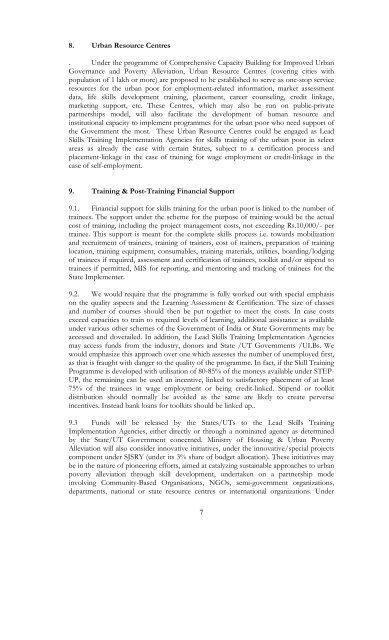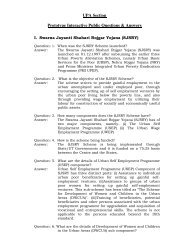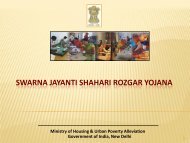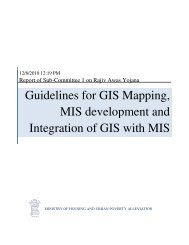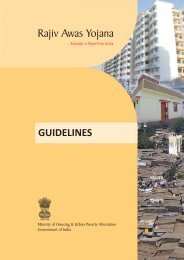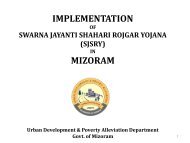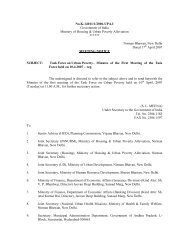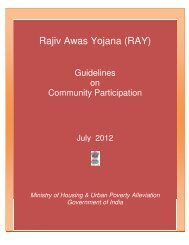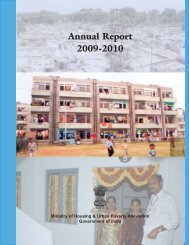Swarna Jayanti Shahari Rozgar Yojana - Ministry of Housing ...
Swarna Jayanti Shahari Rozgar Yojana - Ministry of Housing ...
Swarna Jayanti Shahari Rozgar Yojana - Ministry of Housing ...
You also want an ePaper? Increase the reach of your titles
YUMPU automatically turns print PDFs into web optimized ePapers that Google loves.
8. Urban Resource Centres. Under the programme <strong>of</strong> Comprehensive Capacity Building for Improved UrbanGovernance and Poverty Alleviation, Urban Resource Centres (covering cities withpopulation <strong>of</strong> 1 lakh or more) are proposed to be established to serve as one-stop serviceresources for the urban poor for employment-related information, market assessmentdata, life skills development training, placement, career counseling, credit linkage,marketing support, etc. These Centres, which may also be run on public-privatepartnerships model, will also facilitate the development <strong>of</strong> human resource andinstitutional capacity to implement programmes for the urban poor who need support <strong>of</strong>the Government the most. These Urban Resource Centres could be engaged as LeadSkills Training Implementation Agencies for skills training <strong>of</strong> the urban poor in selectareas as already the case with certain States, subject to a certification process andplacement-linkage in the case <strong>of</strong> training for wage employment or credit-linkage in thecase <strong>of</strong> self-employment.9. Training & Post-Training Financial Support9.1. Financial support for skills training for the urban poor is linked to the number <strong>of</strong>trainees. The support under the scheme for the purpose <strong>of</strong> training would be the actualcost <strong>of</strong> training, including the project management costs, not exceeding Rs.10,000/- pertrainee. This support is meant for the complete skills process i.e. towards mobilizationand recruitment <strong>of</strong> trainees, training <strong>of</strong> trainers, cost <strong>of</strong> trainers, preparation <strong>of</strong> traininglocation, training equipment, consumables, training materials, utilities, boarding/lodging<strong>of</strong> trainees if required, assessment and certification <strong>of</strong> trainees, toolkit and/or stipend totrainees if permitted, MIS for reporting, and mentoring and tracking <strong>of</strong> trainees for theState Implementer.9.2. We would require that the programme is fully worked out with special emphasison the quality aspects and the Learning Assessment & Certification. The size <strong>of</strong> classesand number <strong>of</strong> courses should then be put together to meet the costs. In case costsexceed capacities to train to required levels <strong>of</strong> learning, additional assistance as availableunder various other schemes <strong>of</strong> the Government <strong>of</strong> India or State Governments may beaccessed and dovetailed. In addition, the Lead Skills Training Implementation Agenciesmay access funds from the industry, donors and State /UT Governments /ULBs. Wewould emphasize this approach over one which assesses the number <strong>of</strong> unemployed first,as that is fraught with danger to the quality <strong>of</strong> the programme. In fact, if the Skill TrainingProgramme is developed with utilisation <strong>of</strong> 80-85% <strong>of</strong> the moneys available under STEP-UP, the remaining can be used an incentive, linked to satisfactory placement <strong>of</strong> at least75% <strong>of</strong> the trainees in wage employment or being credit-linked. Stipend or toolkitdistribution should normally be avoided as the same are likely to create perverseincentives. Instead bank loans for toolkits should be linked up..9.3 Funds will be released by the States/UTs to the Lead Skills TrainingImplementation Agencies, either directly or through a nominated agency as determinedby the State/UT Government concerned. <strong>Ministry</strong> <strong>of</strong> <strong>Housing</strong> & Urban PovertyAlleviation will also consider innovative initiatives, under the innovative/special projectscomponent under SJSRY (under its 3% share <strong>of</strong> budget allocation). These initiatives maybe in the nature <strong>of</strong> pioneering efforts, aimed at catalyzing sustainable approaches to urbanpoverty alleviation through skill development, undertaken on a partnership modeinvolving Community-Based Organisations, NGOs, semi-government organizations,departments, national or state resource centres or international organizations. Under7


